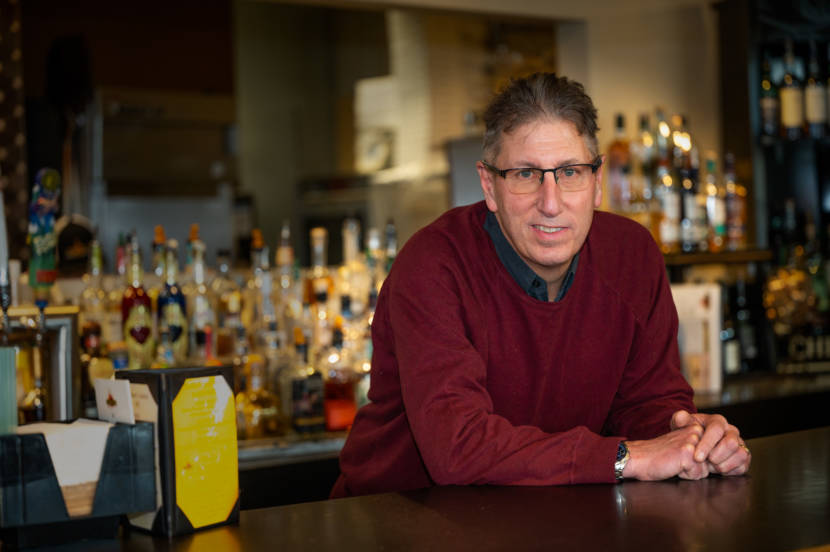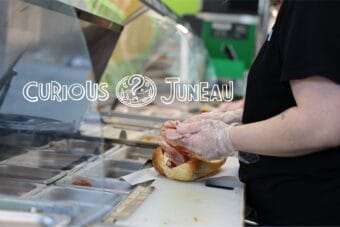
Restaurants are going on two years of income uncertainty and staffing challenges due to COVID-19. Jack Lewis works as an operating partner for several restaurants and chains in Anchorage including Firetap Alehouse and a Krispy Kreme.
He told Alaska Public Media’s Kavitha George that the pandemic is still causing daily headaches in his industry.
Listen here:
This transcript was lightly edited for clarity.
Jack Lewis: People think it’s over, but yeah, it’s not with omicron. You think because of the vaccinations we would be on the downhill run here. But in actuality, the restaurants are getting hit hard again.
There’s a lot of confusion out there. Is it safe to go out? Is it not safe? Even if people have been vaccinated, they’re hesitant about going out. They’re not concerned about being hospitalized, but now they just don’t need to. So here we go, again, where the restaurants get hit hard again. So we are definitely not out of the woods yet by any means. And the workforce continues to be tight as we look for people.
Kavitha George: What does hit hard look like? Is it lowered sales, staff out sick?
Jack Lewis: It’s every area, it’s up and down. Sometimes you think you’re out of the woods, you have a big weekend, and then the following weekend, your sales are way off. You can have a big Tuesday, and then just sit there with an empty dining room on a Wednesday. So it’s all over the place.
The labor market, we are extremely short. My peers in the industry are extremely short. And it’s every area — it’s management, it’s food servers, line cooks, kitchen managers, every area has been affected.
Kavitha George: Have you opted to raise wages to attract workers?
Jack Lewis: I mean, wages are way up there. Probably well over 10% more than we were paying [pre-pandemic]. Close to 20% in some areas. Some you pass on to the consumer and you hope you don’t get pushback because we are paying people better. Minimum wage, I think, is pretty much non-existent in my operation and probably most of my peers up here. We’re paying the highest wages we’ve ever paid in the industry to keep people working, and paying overtime all over the place with the [worker] shortages.
Kavitha George: With the staff that you do have, have you had issues with one person testing positive, then everybody has to test and you have to shut down while you’re waiting?
Jack Lewis: Right. You know, we’re still in a very challenging period here. Because if someone calls in, says “I’ve been exposed to somebody that tested positive,” now we have to wait and see whether they tested positive. And then if they do, we have to notify everyone that we’ve had a positive case. We usually don’t even open until we’ve been assured that everyone has tested negative or has zero symptoms.
And the public gets mixed messages. If you’re closed for a day, even though it could be 100% safe, the public wonders “Wow, well they shut down for that day.” So I think the public is still very confused, should they go out to restaurants or should they not? And we need them in the dining rooms. Because we’re certainly not going to make a living off of takeout and third party carriers, that’s for sure.
Kavitha George: How many times have you had to shut down for a day or even just cut back hours?
Jack Lewis: During the heat of COVID, I shut down several operations for over a week. I shut down Burger Fi for a week, Peanut Farm was shut down for over a week, Firetap Ale House shut down for over a week, Krispy Kreme shut down many days. And you know, your overhead carries on. And it’s an even worse effect because your people aren’t working … for those that couldn’t come into work because we weren’t open, they lost their income. So it was a real domino effect when we had to shut down.
Now we’re in omicron, I would say we’re shut down for like days at a time, or maybe we don’t do lunch hour, or maybe skip a day on a Monday just to play it safe. So we’re sort of going day by day. I wake up in the morning, as head of operations, and I’m fearful to look at my phone.
These are very difficult decisions, because I’m trying to do everything right. And my peers are trying to do everything right. And yet, people need to make a living and they’re trying to get to work.
Kavitha George: What would help you at this point? More relief money, more access to testing?
Jack Lewis: Well, we certainly need some more relief money. There’s no doubt about it. We’re not out of the woods yet. A lot of us don’t have the holding power, should we get hit again.
And then, information to the public, clear information. What are the odds of getting sick in a restaurant? I think they’re slim now, if you’ve been vaccinated. I think the more information out to the public, the better the restaurants will do. I still think there’s a lot of confusion by the general public, which I think is keeping them out of the dining rooms.



